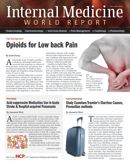Publication
Article
Internal Medicine World Report
PTSD May Elevate Risk of Type 2 Diabetes Mellitus in Women
Author(s):
JAMA Psychiatry has published a study ahead of print examining the relationship between PTSD and T2DM in Nurses' Health Study II participants. The study questioned whether PTSD increased the risk of T2DM among civilians, and the magnitude of change. The findings indicated a positive association.

Post-traumatic stress disorder’s (PTSD) symptomatic behaviors—weight gain pursuant to decreased diet quality and physical activity, smoking, alcohol intake, and antidepressant use)—are independent risk factors for type 2 diabetes mellitus (T2DM). JAMA Psychiatry has published a study ahead of print examining the relationship between PTSD and T2DM in Nurses’ Health Study II participants. The study questioned whether PTSD increased the risk of T2DM among civilians, and the magnitude of change. The findings indicated a positive association.
The researchers mailed the 7-item Brief Screening Scale for DSM-IV PTSD in year 19 of the larger study to identify symptoms. They grouped participants by time since trauma and number of symptoms. Nurses enrolled in this study (N=49,739) completed biennial questionnaires by mail. The main study questionnaire asked whether participants had been diagnosed with T2DM in the past 2 years; if so, the researchers sent a diabetes-specific, questionnaire that asked for additional demographics. Information on race, T2DM family history, education level, anti-depressant use, childhood abuse, and co-morbid mental illnesses (especially depression, binge drinking, and phobic anxiety) were gathered in the main study questionnaire. Because the PTSD supplemental questionnaire was sent late in the study; participants may have dropped and may be underrepresented.
That data indicated 3,091 (6.2%) participants developed T2DM. Participants with more symptoms of PTSD were more likely to have a T2DM diagnosis, with the researchers reporting as follows:
· 2.1 cases of T2DM per 1,000 person-years (women without a history of trauma)
· 2.8 cases per 1,000 person-years (trauma history but no PTSD symptoms)
· 3.7 cases per 1,000 person-years (trauma history and 1 to 3 PTSD symptoms)
· 3.9 cases per 1,000 person-years (trauma history and 4 or 5 PTSD symptoms)
· 4.6 cases per 1,000 person-years (trauma history and 6 or 7 PTSD symptoms)
The severely symptomatic were more likely to be overweight, white, and have a mother with T2DM. The hazard ratio for the severely PTSD symptomatic was 1.8 compared to participants with no history of trauma and 1.4 for participants with one to 3 symptoms. The study found elevated BMI and anti-depressant use to be the strongest predictors of T2DM incidence and no evidence for T2DM causing PTSD. PTSD has also been linked with increased inflammation and hypothalamic-pituitary-adrenal axis suppression (both increasing T2DM incidence as well).
The authors suggest that clinicians screen PTSD patients routinely for T2DM risk factors and development. Increased BMI is a particularly troubling risk factor for T2DM. The study authors also propose future research on the role of stress-induced inflammation in T2DM development.






